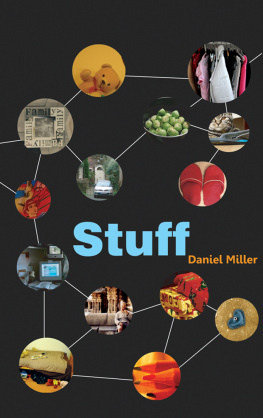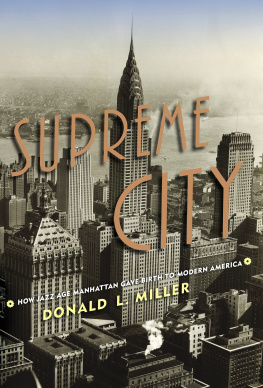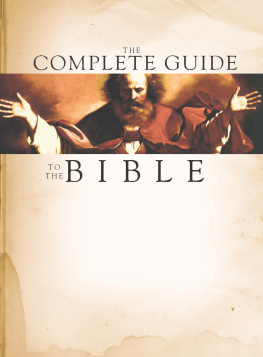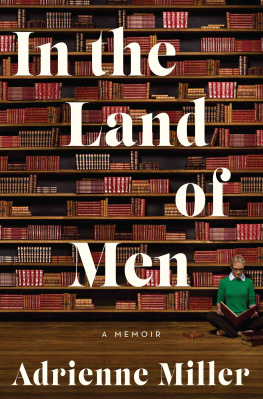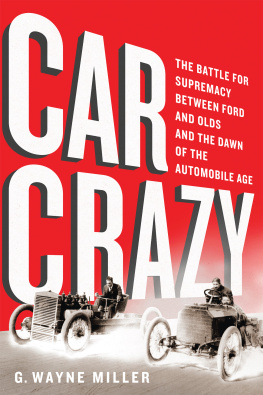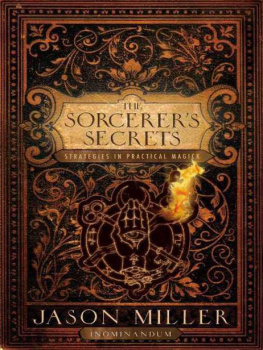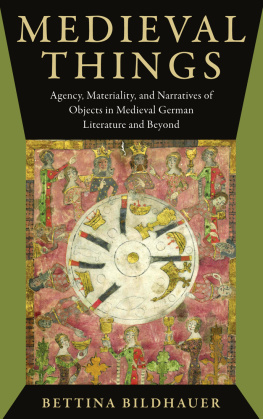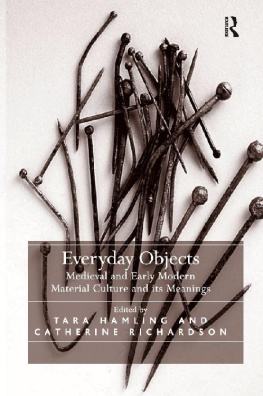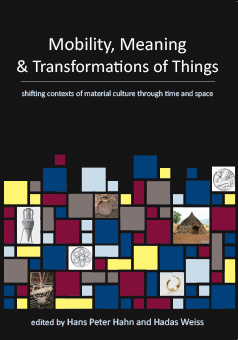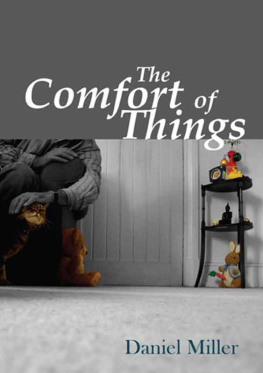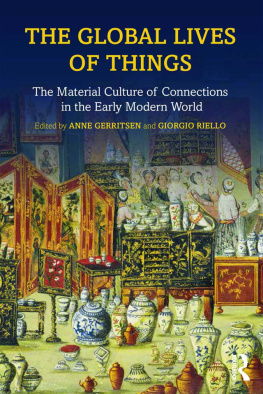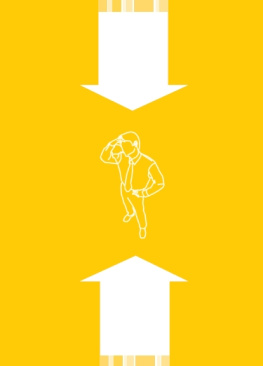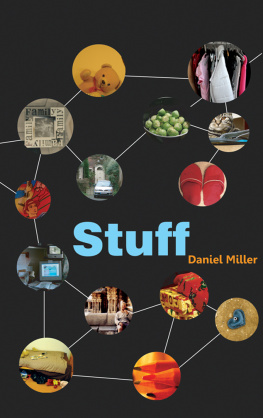The right of Daniel Miller to be identified as Author of this Work has been asserted in accordance with the UK Copyright, Designs and Patents Act 1988.
All rights reserved. Except for the quotation of short passages for the purpose of criticism and review, no part of this publication may be reproduced, stored in a retrieval system, or transmitted, in any form or by any means, electronic, mechanical, photocopying, recording or otherwise, without the prior permission of the publisher.
A catalogue record for this book is available from the British Library.
The publisher has used its best endeavours to ensure that the URLs for external websites referred to in this book are correct and active at the time of going to press. However, the publisher has no responsibility for the websites and can make no guarantee that a site will remain live or that the content is or will remain appropriate.
Every effort has been made to trace all copyright holders, but if any have been inadvertently overlooked the publishers will be pleased to include any necessary credits in any subsequent reprint or edition.
Acknowledgements
I have always felt that a subject called Social Anthropology could manage to be a hell of a lot more social than is commonly the case. As a result, I changed my way of working many years ago. Increasingly I carry out almost all my research in collaboration. This means that, although this book is largely about my research, it presents results and ideas that have, in most cases, been developed only through my engagement with others. It is impossible, for example, to consider my discussion of the sari in chapter 1 without this being also credited simultaneously to Mukulika Banerjee, or that of the Jamaican mobile phone without this being equally seen as the work of Heather Horst. Other research collaborators have included Zuzana Brikov for the work on au pairs, Alison Clarke for the work on shopping, Mirca Madianou for the work on long-distance relationships, Lucy Norris for the work on clothing and waste, Fiona Parrott for the work on loss, Don Slater for the work on the Internet in Trinidad, and Sophie Woodward for the work on denim.
One of the other delights of my work has been the collaboration with students and especially with PhD students. This creates a vicarious pride which is not entirely dissimilar from that of parents and children. As in the latter case, it is often the younger party that shows much more maturity than the older. Many years ago I established something we call a dinner/drinking group, which meets monthly to drink, discuss pre-circulated papers by the students and then eat (and occasionally party). Sometimes in each others homes, sometimes in my office, sometimes in restaurants.
Thanks to this format, friendships have often been formed, and also collaborative publications. The publications in turn reflect the cross-influence between what often started as quite different projects. This has made it easier to produce edited collections with relative coherence compared to most such volumes. So I owe a considerable amount to past and present PhD students: Ivana Bajic, Ira Berdichevsky, Julie Botticello, Achsah Carrier, Pat Clark, Alison Clarke, Magda Craciun, Dimitrios Dalakaglou, Inge Daniels, Adam Drazin, Justin Finden-Crofts, Pauline Garvey, Cleo Gougoulis, Martha Guarneros, Anat Hecht, Heather Horst, Gabrielle Hosein, Neil Jarman, Mark Johnson, Emma Lindblad, Tom McDonald, Desmond Mallikarachichi, Simone Mangal, Jean-Sbastien Marcoux, Marjorie Murray, Razvan Nicolescu, Kaori OConnor, Bodil Olesen (honorary), Panarai Ostapirat, Andrea Pellegram, Anna Pertiera, Elia Petridou, Sigrid Rausing, Tom Rogers, Ed Ross, Florian Schlichting, Miran Shin, Andrew Skuse, Jo Tacchi, Chang-Kwo Tan, Sophie Woodward. In addition, over the years there have been constant visitors, students who came for just a few months, who joined this group, and then left again; I simply cannot mention all these and I hope they will forgive me. Others who have commented on this manuscript include Eleana Yalouri and Karen Ida Dannesboe as well as anonymous reviewers.
I also owe a considerable debt to my colleagues over the years in material culture studies at University College London. That is, Barbara Bender, Victor Buchli, Paolo Favero, John Gledhill, Suzanne Kchler, Chris Pinney, Michael Rowlands, Chris Tilley and Graeme Ware. I have only ever worked at UCL and never once been tempted by any other potential job. There are also many colleagues around the world who have encouraged and inspired me from time to time, and helped especially when I was first developing these ideas, for example, Rob Foster, Nicky Gregson, Caroline Humphrey, Webb Keane, Marilyn Strathern, Nicholas Thomas and Rick Wilk. As well as others, sadly deceased, such as Judy Attfield, Alfie Gell and Marianne Gullestad.
On a more personal note, of particular importance has been the friendship and advice over the years of Mukulika Banerjee, Kathryn Earle and Stephen Frosh. Nothing I do has ever been possible without the support of Rickie, Rachel and David and I would like to thank Rickie, in particular, for her assistance in editing the text. Finally I am indebted to a vast number of people who have granted me such generous help during fieldwork in a dozen different countries over many many years. I cant name them but it is their ideas and actions that inform this book.
Prologue: My Life as an Extremist
Dont, just dont, ask for or expect a clear definition of stuff. Sure, there are academic traditions that believe knowledge is best conveyed through such clear definitions. This is perhaps essential in the natural sciences. But personally I have always had a horror of what I think of as pedantic semantics. To try and determine the exact criteria by which some things would be excluded from stuff as perhaps less tangible, or too transient, would be a hopeless exercise. Does an email or a fashion count as stuff, a kiss or a leaf or polystyrene packing? This is a book about the variety of things that we might term stuff, but nowhere in this volume will you find any attempt at a definition of that term. Rather it is intended to introduce my own perspective on the study of material culture, a set of studies that are principally concerned with stuff. Material culture is no better defined than stuff is. In practice these studies have promiscuously picked up on interesting topics and perspectives that more self-absorbed, well-defined sub-disciplines felt were outside of their brief. Material culture thrives as a rather undisciplined substitute for a discipline: inclusive, embracing, original, sometimes quirky researches and observations.
Material culture starts, after all, with mere happenstance: the history of the established academic disciplines. Some of these seem obvious; we have language and so we have linguistics. Others on reflection seem a trifle bizarre. The study of rocks is allocated to geography, and then somehow the study of traffic gets mixed into the pot. Yet no one thought to have an academic discipline whose specific area of study would be artefacts, the object world created by humanity. It could so easily have been otherwise. Consider the degree to which established academic disciplines, from archaeology to architecture, from sociology to design, require theories and perspectives on this material world. If material culture had existed for a century of established study in thousands of colleges, it would have been as taken for granted as linguistics is today. But this didnt happen and it is not the purpose of this book to create a discipline where there wasnt one. Instead it seeks to welcome this aberration; to embrace the openness and collegiality of not having to be overly disciplined. Stuff as a term serves just fine. Not establishing a discipline doesnt mean that a study of stuff lacks substance or consequence. Material culture studies are becoming recognized as a vital contribution to half a dozen established disciplines, from archaeology to design. We provide many theories, and analytical approaches, for example, in discussing the specific nature and consequences of materiality. Several of these are discussed in the course of this book.

